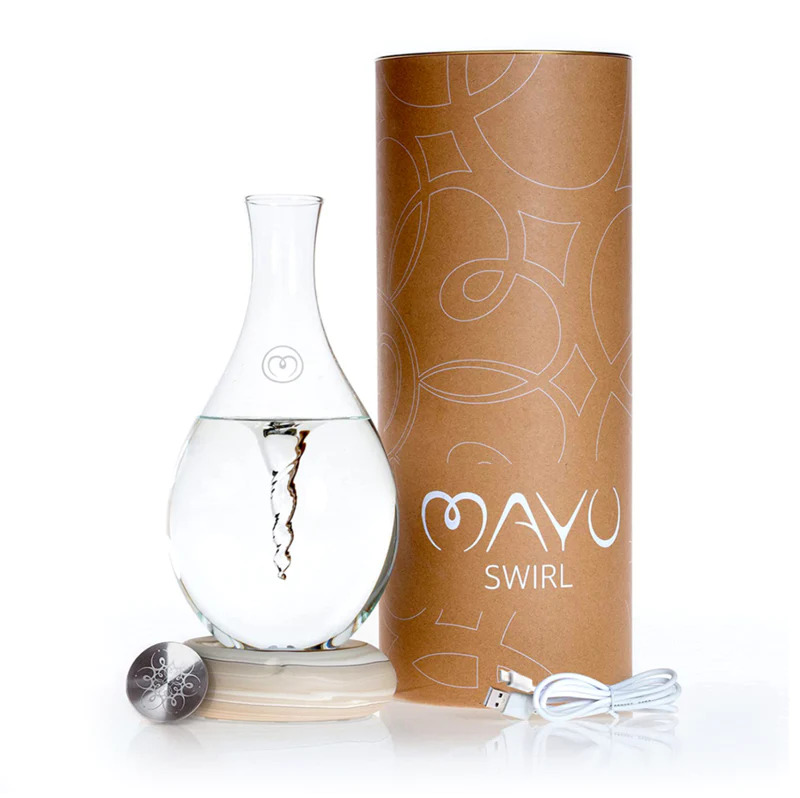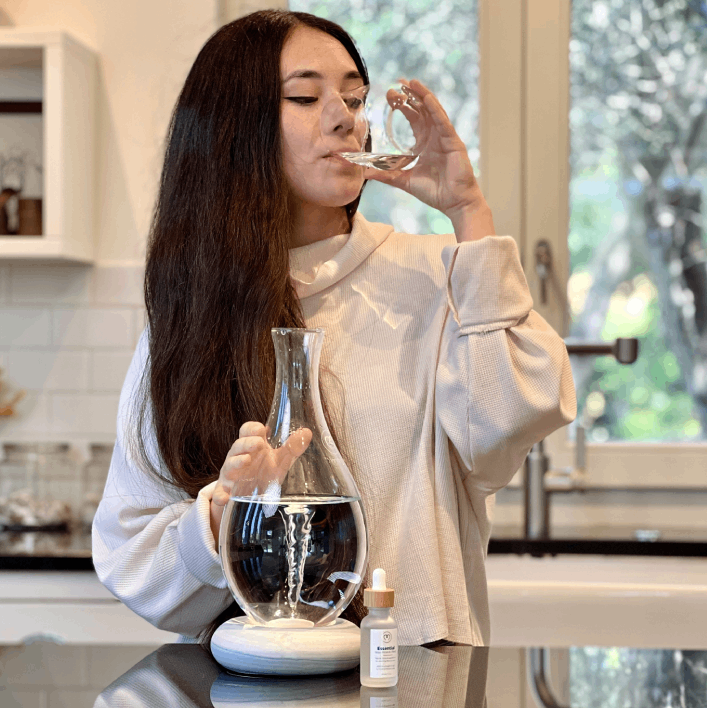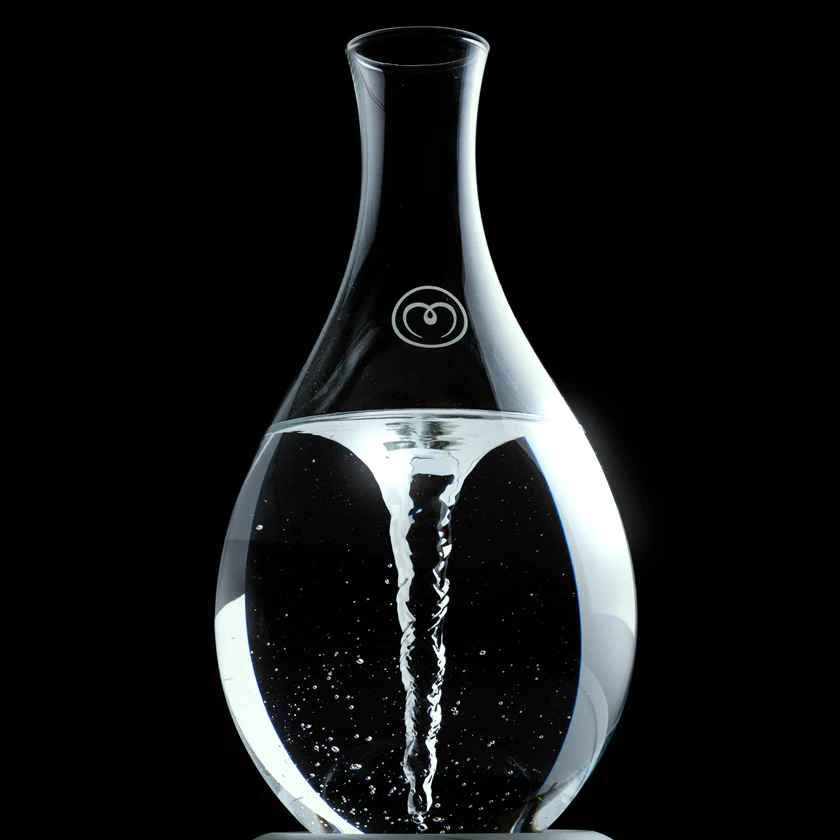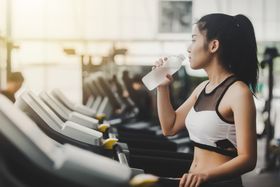Is Sparkling Water Just as Hydrating as Regular Water?
Curious if those refreshing bubbles might be working against your hydration? Discover what science says about sparkling water's hydration effectiveness compared to still water.
Published April 30, 2025

Ever wonder if those refreshing bubbles in your sparkling water might be working against your hydration goals?
Well, the sparkling vs. still water debate has many of us questioning whether our fizzy water habit is helping or hurting our hydration. Let's cut through the confusion and see what science tells us.
» Not keen on sparkling or still? Try MAYU's Structured Water instead.
What Makes Sparkling Water Different?
Before we look into hydration effects, let's understand what makes sparkling water unique compared to regular water:
Carbonation
The main difference is obvious—sparkling water contains dissolved carbon dioxide gas that creates those satisfying bubbles. When CO2 dissolves in water, it forms carbonic acid (H2CO3), which gives sparkling water its slight acidity and distinctive mouthfeel.
Mineral Content
While regular tap water contains naturally occurring minerals like calcium, magnesium, and sodium, sparkling waters often have added or enhanced mineral profiles. Research analyzing 126 sparkling water brands found wide variation in mineral concentrations, with some containing higher calcium and sodium levels than others [1].
Acidity Levels
Due to the carbonic acid formation, sparkling water has a pH between 5.5 and 6.8, making it slightly more acidic than regular water, which usually ranges from 6.9 to 7.5. This difference, while measurable, is relatively minor compared to truly acidic beverages like soda (pH 2.5-3.5) [2].
Added Ingredients
Some sparkling waters, particularly flavored varieties, may have additional ingredients like natural flavors, citric acid, or occasionally sweeteners. Plain sparkling water, however, is typically just water and carbon dioxide.
» Learn how to increase the pH of drinking water naturally
Does Sparkling Water Actually Hydrate You?
Now for the big question—can sparkling water keep you as hydrated as regular water? Let's look at the research.
Hydration Effectiveness
According to the Beverage Hydration Index (BHI) study, sparkling water and still water score identically in terms of hydration effectiveness [3]. This scientific measurement looks at how much fluid is retained in the body rather than being quickly eliminated through urine.
The research measured fluid retention two hours after consumption and found no significant difference between still and sparkling water. This suggests that the carbonation doesn't interfere with your body's ability to use the water for hydration.
» Explore the best types of water to drink for cellular hydration
Absorption Rates
Some minor differences exist in how quickly your body processes sparkling versus still water:
- Sparkling water has a slightly higher osmolality (7 mmol/kg) than still water (2 mmol/kg).
- Both are considered hypotonic drinks (lower solute concentration than body fluids), which are absorbed faster than sugary beverages.
- According to Ronald Maughan, lead researcher of the BHI study, sparkling water might sometimes reach the small intestine slightly faster than still water.
These differences are minimal and unlikely to significantly impact your overall hydration status throughout the day.
When Might Sparkling Water Be Advantageous?
Sparkling water can offer some unique benefits in certain situations:
- When You're Extra Thirsty: Studies suggest carbonation can quench thirst more effectively than still water. One study found that participants who drank carbonated water consumed 25% less plain water afterward, indicating their thirst was better satisfied by the sparkling option [4].
- When You Need To Regulate Your Appetite: The carbonation in sparkling water can promote a feeling of fullness, potentially helping with hunger management. Research has shown that drinking carbonated water can decrease hunger sensations while increasing feelings of fullness [5].
» Explore the benefits of water in digestion
When Regular Water Might Be Better
There are certain situations where still water might be the preferred choice:
- During Intense Exercise: Some people find that carbonation can cause discomfort during high-intensity activities, especially endurance sports, where they might lose up to 2.8 liters of water per hour. However, sparkling water with added minerals might help replenish electrolytes lost through sweat [6].
- Digestive Sensitivities: If you're prone to bloating, acid reflux, or irritable bowel syndrome, the carbonation in sparkling water might worsen these conditions. Still water is generally more comfortable to consume in larger quantities in these cases.
- Accessibility: In practical terms, still water is usually more readily available, especially in outdoor or remote settings where carrying carbonated beverages might be impractical.
» Go over the best types of water for an athlete to drink
Hydration Across Life Stages
Different age groups have varying hydration needs and considerations regarding sparkling water. Let's explore the differences:
Children
The American Academy of Pediatrics recommends 16-40 fluid ounces of water daily for children ages 5-8, increasing as they grow [7]. While there's no specific guidance against sparkling water for children, parents should be mindful of dental hygiene and choose options without added sugars or acids.
Adults
The CDC recommends about 11.5 cups of fluids daily for women and 15.5 cups for men [8]. Sparkling water can contribute to these totals for you without specific health concerns. If you're monitoring your daily water intake, sparkling water counts toward your hydration goals just as much as still water.
Older Adults
Seniors may have special hydration considerations. The European Society for Clinical Nutrition and Metabolism recommends 1.6 liters daily for older women and 2 liters for older men [9].
Interestingly, one study found that carbonated beverages improved swallowing time in older adults, potentially improving hydration in this age group.
For those with heart, kidney, or liver conditions requiring fluid restrictions, it's vital to consult your healthcare providers about still and sparkling water consumption.
» Make water enjoyable with recipes to make tasty drinks at home
Debunking the Dehydration Myth
Despite scientific evidence supporting sparkling water's hydration effectiveness, some people still believe it might be dehydrating. Let's address this misconception.
The belief likely stems from a few factors:
- The sensation of thirst is quenched more quickly with sparkling water, potentially leading to less drinking.
- Occasional reports of bloating or digestive discomfort might discourage continued drinking.
- Confusion between sugar-sweetened carbonated beverages (which can impact hydration) and plain sparkling water.
However, physiological evidence clearly shows that sparkling water hydrates like still water. The minor differences in absorption rates don't significantly impact overall hydration status for most healthy individuals.
The Verdict: Yes, Sparkling Water Hydrates
The science is clear—sparkling water hydrates just as well as still water for most people. But what if you want something special without the bubbles?
MAYU's vortexing technology gives you the best of both worlds! By creating a gentle swirl that mimics nature's streams, the MAYU Swirl naturally enhances your water's taste and oxygen content. It gives you that refreshing experience without the potential bloating or acid reflux from carbonation, and may even improve how your cells absorb water.
Bottom line? Choose what works for you—whether that's sparkling, still, or structured water from MAYU's innovative system. Just make sure you're drinking enough each day.
References
S. J. M. Stoots et al., “Variations in the mineral content of bottled ‘carbonated or sparkling’ water across Europe: a comparison of 126 brands across 10 countries,” Editor-in-Chief S Voice List of Authors Is an Important Element in a Scientific Publication, vol. 74, Jan. 2021, doi: 10.5173/ceju.2021.0331.r1. Available: https://pmc.ncbi.nlm.nih.gov/articles/PMC8097654/
M. Morgado, C. Ascenso, J. Carmo, J. J. Mendes, and A. C. Manso, “pH analysis of still and carbonated bottled water: Potential influence on dental erosion,” Clinical and Experimental Dental Research, vol. 8, no. 2, pp. 552–560, Feb. 2022, doi: 10.1002/cre2.535. Available: https://pmc.ncbi.nlm.nih.gov/articles/PMC9033543/
R. J. Maughan et al., “A randomized trial to assess the potential of different beverages to affect hydration status: development of a beverage hydration index,” American Journal of Clinical Nutrition, vol. 103, no. 3, pp. 717–723, Dec. 2015, doi: 10.3945/ajcn.115.114769. Available: https://doi.org/10.3945/ajcn.115.114769
C. P. D. Gachons et al., “Oral cooling and carbonation increase the perception of drinking and thirst quenching in thirsty adults,” PLoS ONE, vol. 11, no. 9, p. e0162261, Sep. 2016, doi: 10.1371/journal.pone.0162261. Available: https://doi.org/10.1371/journal.pone.0162261
M. Suzuki, E. Mura, A. Taniguchi, T. Moritani, and N. Nagai, “Oral carbonation attenuates feeling of hunger and gastric myoelectrical activity in young women,” Journal of Nutritional Science and Vitaminology, vol. 63, no. 3, pp. 186–192, Jan. 2017, doi: 10.3177/jnsv.63.186. Available: https://doi.org/10.3177/jnsv.63.186
“Sports and Hydration for Athletes: Q&A with a Dietitian,” Johns Hopkins Medicine, Oct. 30, 2023. Available: https://www.hopkinsmedicine.org/health/wellness-and-prevention/nutrition-and-fitness/sports-and-hydration-for-athletes
“AAPD | Top health experts release new drink recommendations for kids and teens’ overall health.” Available: https://www.aapd.org/about/about-aapd/news-room/new-drink-recommendations-for--kids-and-teens/
“How much water do you need?” Available: https://www.eatright.org/health/essential-nutrients/water/how-much-water-do-you-need
D. Volkert et al., “ESPEN guideline on clinical nutrition and hydration in geriatrics,” Clinical Nutrition, vol. 38, no. 1, pp. 10–47, Jun. 2018, doi: 10.1016/j.clnu.2018.05.024. Available: https://doi.org/10.1016/j.clnu.2018.05.024
Disclaimer: The information published by MAYU Water is not a substitute for the expert knowledge, advice, and recommendations of trained professionals. We strongly recommend consulting with industry experts and primary or scientific sources before making any health, research-related, or other important decisions.


















































